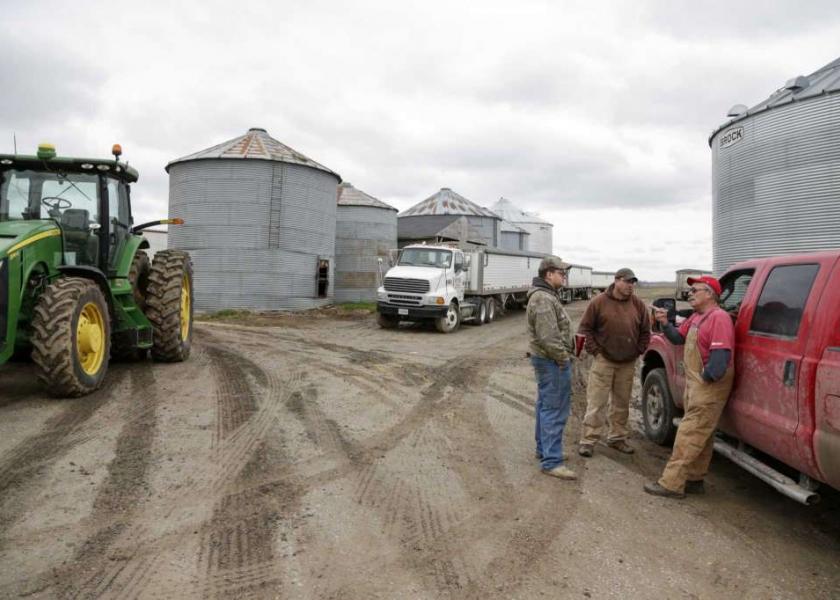House Committee Nixes Transfer Tax Proposal, Farm CPA Bumps Grade From 'F' to 'B-'

Since President Biden’s America’s Family Plan was unveiled and a “transfer tax” was introduced, farmers and ranchers have been vocal about the financial implications it could cause. A new plan outlined by the House Ways and Means committee this week put some farmers’ fears to rest, as it didn’t include the transfer tax and left the “step-up in basis” intact.
The House’s plan is a more favorable plan for family farmers and ranchers, says Farm CPA Paul Neiffer, but it does include some changes that could cause dairy farmers and larger farms to pay more.
“As far as a grade, what used to be probably an ‘F’ type plan is now up to about a ‘B-‘ or ‘C+’, at least based on the House Ways and Means Committee proposals that came out,” says Neifer, an CPA and partner with CLA.
He says one of the biggest benefits in the House’s plan is it sets up a scenario where farmers won’t be hit with increased taxes at death, as the transfer tax is no longer included and the full step-up in basis remains.
“There's no longer a transfer tax due at death,” says Neiffer. “There potentially could be an estate tax due, but with the estate tax, if you have a farmer that has a large estate, and it's all related to farming assets, the IRS allows them to pay that tax over a 15-year period. So, it's not like they have to come up with a lot of tax upfront. If there's liquid assets, yes, they have to pay cash for that. But liquid assets are going to cover that. So, they didn't really make any changes there.”
Farm Journal Washington Correspondent Jim Wiesemeyer says the National Farmers Union (NFU) released a letter urging congressional leaders to preserve the step-up in basis late last week. The letter said the new tax liabilities “may lead to the premature sale of family farms and ranches and contribute to a worrying trend toward greater farmland consolidation and corporate control of our food system.”
KCoe Isom, a food and ag accounting firm, applauded the proposed tax package announced by Democrats this week, saying the elimination of previously-suggested changes to the step-up in basis significantly impacts farmers and ranchers.
“We are pleased that the proposed tax bill does not include changes to the step-up in basis,” says Brian Kuehl, Director of Government and Public Affairs for KCoe Isom. “These changes would have presented significant challenges for larger farmers and ranchers seeking to pass their property onto their children. We know that a number of rural and farm-state Democrats weighed in against these changes and we’re pleased to see that their voices were heard and the proposed change to tax capital gains at death was omitted.”
Just last week, Agriculture Secretary Tom Vilsack wrote an op-ed, defending the changes to the step-up in basis saying it won't hurt family farmers. He also outlined his reasoning on AgriTalk with Chip Flory on Monday's show.
Neiffer adds there are some potential estate tax changes, with the $11.7 billion estate lifetime exemption would now be $5.85 billion indexed to inflation.
"The estate tax, if you have a farmer that's got a large estate, and it's all related to farming assets,the IRS allows them to pay that tax over a 15-year period," he says. "So, it's not like they have to come up with a lot of tax up front. If there's liquid assets, yes, they have to pay cash for that. But liquid assets are going to cover that."
KCoe Isom points out the estate tax exemptions that were doubled in 2017 were set to expire after 2025. The proposed bill would accelerate that expiration to December 31, 2021.
Giving the Tax Plan a Grade
Neiffer says if the transfer tax is put back on the table in the Senate’s proposal, his outlook on the updated tax proposal shifts to a more negative view.
“If that did come back into play, then this will go from a ‘B-‘ down to about a ‘D,’” he says.
Overall, Neiffer says the House Ways and Means Committee plan has some positive changes for family farmers and ranchers, which includes:
- If you have a farmer that farms a “C Corporation,” right now their tax rate is 21%. This actually drops it down to 18% on taxable income up to $400,000.
- Increase in estate tax exclusions, which means a farmer can reduce their estate by from about $1.2 million, up to $11.7 million per person.
- Dropping the extra 12.4% self-employment tax on income over $400,000 and replacing it with the 3.8% net investment income tax, due to social security requirements.
“But they can make a change to net investment income and bring in more income,” says Neiffer.
As for changes that could negatively impact some farmers and producers, Neiffer says those include capping the Section 199A capital gains 20% deduction at $500,000, as well as increasing the capital gains tax rate.
“The top capital gains rate could go from 20% to 25%, and it might kick in quicker, at around $450,000 of taxable income,” says Neiffer. “That's a detriment, especially for dairy producers and livestock producers who have a lot of capital gains.”
He says capping the special 199A 20% deduction at $500,000 could also harm some of the large-scale operations.
“Maybe this isn't a big deal for some producers, but for those larger producers, they get a large DPAD deduction for a cooperative, which could be some detriment to them,” he says.
Biggest Winners in Tax Plan
Neiffer says overall, the biggest winners in the farm arena under the House and Ways Committee proposal includes farms that are a C corporations, as they’ll see a tax decrease instead of an increase.
“The biggest losers are farmers with higher income or outside sources of income that also farm on the side--their taxes could go up by 10% to 20%, potentially,” he says. “So, it could be a lot more taxes for farmers netting more than $400,000 of taxable income on an annual basis. They're definitely going to see their tax liability go up by at least 10%. It could be as high as 20% or 25%, depending on their income depending on the makeup of the income.”
While the Senate hashes out its tax proposal, it's unclear whether the Senate version will make similar changes as the House. Wiesemeyer reported the House Ways and Means Chair Ricard Neal (D-Mass.), Rep. Bill Pascrell (D-N.J.) and Rep. Tom Suozzi (D-N.Y.) released a statement saying, “President Biden’s historic Build Back Better plan is one of the most significant bills Congress has ever considered. Its makeup is complex and will be shaped and crafted continuously to get it right. So, what we consider now is an important step in the process, but not the final step.”







